#exactly what i was thinking op
Text
Something I love about Leo is that, canonically, he IS capable of cooking, he’s just completely incapable of using a toaster. He’s banned from the kitchen not out of an inability to make edible food, but because being within six feet of a toaster causes the poor appliance to spontaneously combust.
#rottmnt#rise of the teenage mutant ninja turtles#rottmnt leo#rottmnt headcanons#rise leo#all Leos mortal enemy: toasters#side note but thinking about this aspect of Leo’s character really has me wanting to make a deeper dive into Leo as a Jack of All Trades#because he has aspects of this all throughout the series#where he can do many things he’s just not the best at it#like he can cook but he’s no Mikey#he can - canonically - rewire an *AI PROGRAM* but it goes very wrong#he can lift both Mikey and Raph simultaneously but he struggles to do so where his other brothers don’t even break a sweat#bro is a Jack of All Trades Master of None frfr#and Leo is even more interesting with this in mind because he uses what he CAN do so well#it’s like how he can see his family’s strengths and weaknesses and knows exactly how they work#his skill set is made way better simply by his personal USE of those skills not by the skills themselves#portals and teleportation are only op if you know how to weaponize them#given time he ABSOLUTELY could#okay I shut up now this was supposed to be about toasters#but yeah all the boys have a bunch of skills under their belts outside the typical ones#but Leo stands out to me for having skills his other brothers have but to a much lesser degree in a lot of cases#and he works with what he has so well that that is a skill in itself
384 notes
·
View notes
Text
anyone else get sad when ur reading a fic and koby is there but not helmeppo? like i know ur doing an au where koby joined luffy or whatever but like. that’s his buddy. do not separate
#what i’m saying is make luffy bring helmeppo with them u cowards#come on he’s a little shit with daddy issues that like prime luffy yoinking bait#also he’s my boy i love him#i think if luffy had seen morgan punching helmeppo he would’ve treated him differently#or maybe he would’ve been exactly the same idk#one piece#one piece fic#helmeppo#one piece helmeppo#op koby#op helmeppo#one piece koby#is it coby or koby#op coby#one piece coby#cobymeppo#kobymeppo#<- just a little#posts from the ocean
72 notes
·
View notes
Text
do you ever think about how marco is one of the last people who knows how close shanks and buggy once were? do you think he ever looks at shanks and instinctively searches for buggy? i bet you marco looks at shanks surrounded by his crew and still thinks that shanks looks lonely. because back then, you could never find one without the other. if you insulted shanks, you insulted buggy and vice versa. they were attached at the hip. if you got one of them alone, you better savor it because in the next five minutes, the other one would come find them. like in my heart i know every time marco sees shanks these days all he thinks is where's the rest of you?
#marco who has first hand knowledge about how close shanks and buggy used to be#marco who never knows what to think when he sees shanks these days bc what happened? where's buggy?#where's the rest of you?#marco who hears about buggy's arrest and his first thought is 'oh fuck shanks isn't gonna like that' until he remembers that they dont talk#marco who privately thinks that shanks' less than who he used to be#marco who wonders what exactly happened to roger's cabin boys#i like to think ace asks him once why he always gets that funny look on his face whenever he sees shanks and marco doesn't know how to expl#the seas greatest mystery. bc how do you explain that these two people who were once so close don't even seem to think about each other#anymore. how do you explain just how well buggy and shanks clicked? how do you explain what they used to be to someone who has only ever#seen the broken remnants of what they are now?#head in hands head in hands head in hands#fushichou marco#marco the phoenix#op marco#akagami no shanks#op shanks#shanks one piece#buggy the clown#buggy one piece#op buggy#shanks x buggy#shuggy#one piece
97 notes
·
View notes
Text
actually I'm still not done with this crossover
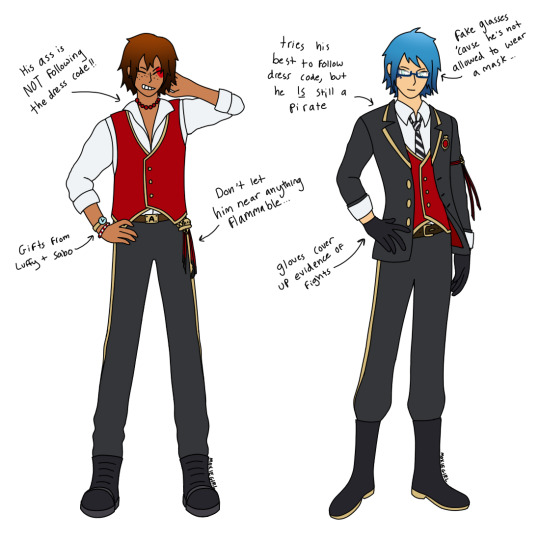


I imagine Deuce has to physically wrestle Ace into wearing a shirt most days lol
#i still dont know exactly whats going on in this au tbh#im leaning towards a reincarnation crossover but idk#all i know is that yuu is suffering™#also sabo is there. hes in ignihyde i think#luffy's still a few years away from NRC age#hed be in savanaclaw tho i think#adeuce#twisted wonderland#one piece#crossover#ace trappola#deuce spade#portgas d ace#masked deuce#twst#op#ace x deuce#acedeu#acedeuce#twst ace#op ace#ace#twst deuce#op deuce#deuce#disney twisted wonderland#moxie draws
63 notes
·
View notes
Text
the introduction to the scene has first franky running after robin (he's annoyed, at least, or angry.) and rob lucci asserts that it's okay to leave them together because they must have absolutely no hope at this point.
it starts with robin telling franky iceberg survived, and that leads him to comment "you act tough, but you have a heart like anybody else". it's a good observation to make, and it's the same one you can make about franky.
he then lists consequences, consequences of their actions here, consequences of the governments actions, and this scene is a lot like the one with usopp and franky. currently, franky is poking at every nerve robin has, she doesn't want to be told that what she's doing is going to affect things. he manages to poke at her the same way he did usopp, and tom remarks that the problem with franky is that "he's too honest", which is the function he serves in these scenes.
"if I'm with them it'll only bring them suffering" blamed for the actions of a government you can't control and of oppression you can't control.
frankys dub voice actor does a good job here, speaking softly, not only hope but comfort laced into his voice- a deliberately soothing presence in a situation nobody but the government is to blame for.
rob lucci asserts that franky and robin can't have hope, but franky continues to have hope for the both of them, continues to give robin comfort, because he's lived through oppression and through suicide and through toms death. existence isn't a crime, and he knows it because he's lived through enough to know it to be true. he extends that solidarity- solidarity, not pretending like hes better than her or that she's an other that he can't understand
w7, ultimately, is a story about trauma and survival and what surviving looks like when you have all of that trauma- it pulls absolutely no punches, but expects you to sympathize and believe in these characters (franky, usopp and robin) anyways. and the extent of the solidarity and love given between the characters that are struggling is unparalleled- and the narrative subtext of frankys queerness here, that franky is queer and on top of everything that that is some part of the reason he understands robin, it's beautiful.
to me, this is the only narrative that matters.
#w7 watch#op#one piece#meta#cyborg franky#nico robin#this is the end of the w7 metaposting im going to rewatch el but i dont think ill metapost about it as much#this experience has served exactly what i wanted it to#thank you all for reading
20 notes
·
View notes
Text
Women dressed in ceremonial Mongolian attire.
#ceremonial in the sense that these clothing are mostly worn for the most formal occasions like weddings#or i think (but can't confirm bc op didn't say exactly but their post history suggests) this is for a stage performance#罟罟冠#<-- what the tall hat/crown has been called in chinese since around the yuan dynasty#douyin#video#tiktok#少数民族
595 notes
·
View notes
Text
(Sorry my Op.5 hype is off the charts: super long post up ahead with a bit of analysis into why Sherlock says the things he does to convince William to live)
Can I just say that Morimyu Op. 3 does a fantastic job at setting up the confrontation between William and Sherlock?
William sings, conflicted, about whether he can still find forgiveness. His mind is set on dying (alone), but there's a part of his heart that wavers.
AND THEN. AND THEN!!!!! SHERLOCK MEETS HIM IN DURHAM AND TELLS HIM
A crime is still a crime, no matter how noble the intention. He cannot forgive killing others and using the deaths of people, even despicable people. (Which is beautifully contrasted against the Jack the Ripper case btw). He will catch the Lord of Crime and punish him for his actions.
It's at that point that William turns a bit sorrowful and resigned (and Shogo's expression is so!!!! SO!!!!! wow his despair is palpable) almost as if he's thinking to himself 'as expected, there is no forgiveness for someone like me' and probably solidifies his idea that death is the only suitable recompense for him.
--
ANYWAY back to the manga itself

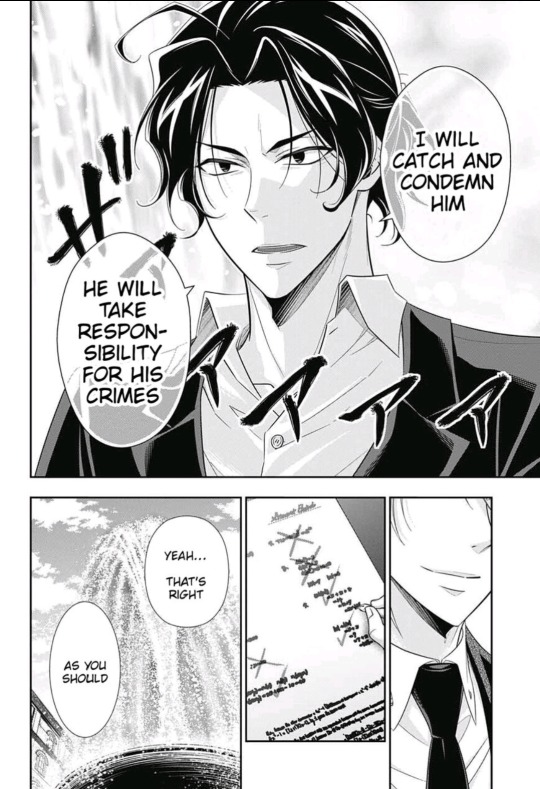
His sorrowful condemnation:

I think that it's precisely because of this, the only person whose forgiveness can change his mind is Sherlock.
It doesn't matter that Fred or Louis or what any others think. They can call him a good person all they want, but it doesn't change the fact that in his mind, he is already condemned.
(Besides that, his accomplices are all evil because their plan is inherently evil to him. Their words hold little weight. A sinner can't save another.)

That is, until Sherlock tells him this.
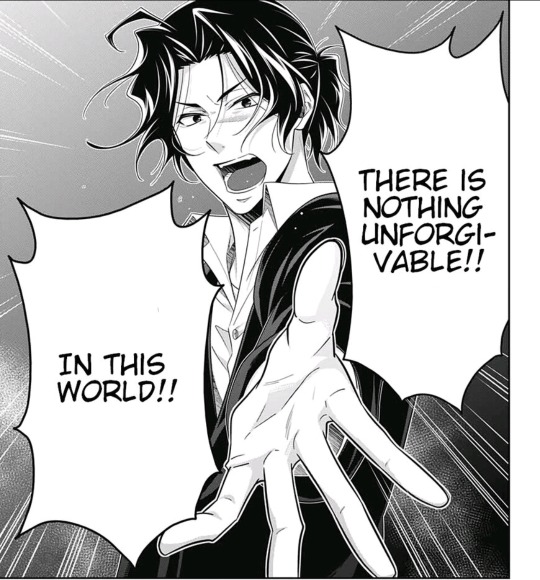
And suddenly his entire worldview is upended. Because all this time, he believed there was only condemnation to be found for someone like him.
Sherlock, his righteous actor in the stage of London's crimes, has deemed him worthy of redemption.
And if the one good person thinks that William can be saved...
But no! How can believe that? William James Moriarty is the devil incarnate. He is stained. His sins are unforgivable, no matter what Sherlock says. Murder is unforgivable, right?
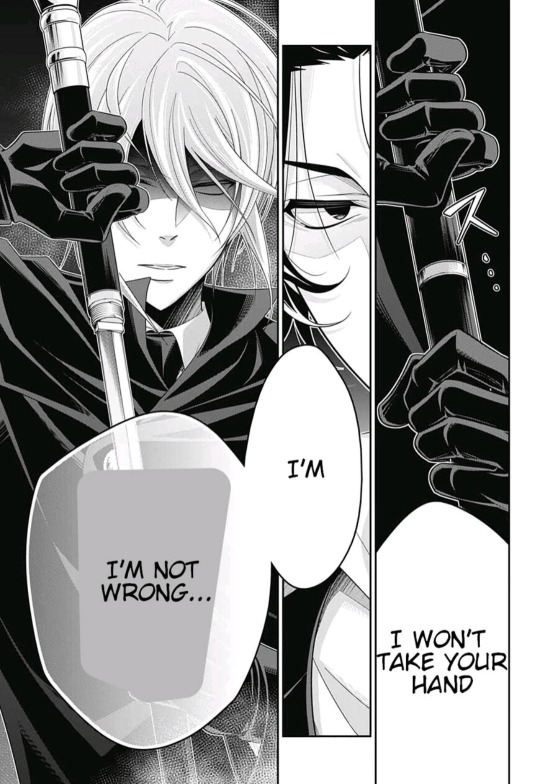
So Sherlock flips the script.
He reminds William that HE is also a criminal and murderer. (It's a perfect crime in the eyes of the law, but William knows the truth)
He becomes the mirror reflecting William's image so that William can come to the realisation that they are all capable of good and evil.
The greatest evil is capable of good.
The greatest good (Sherlock - in Liam's eyes, at least) is capable of evil.
And if William can still think of Sherlock as good despite this,
And if William can forgive Sherlock for murder...
Then why can't William himself be forgiven for murder?
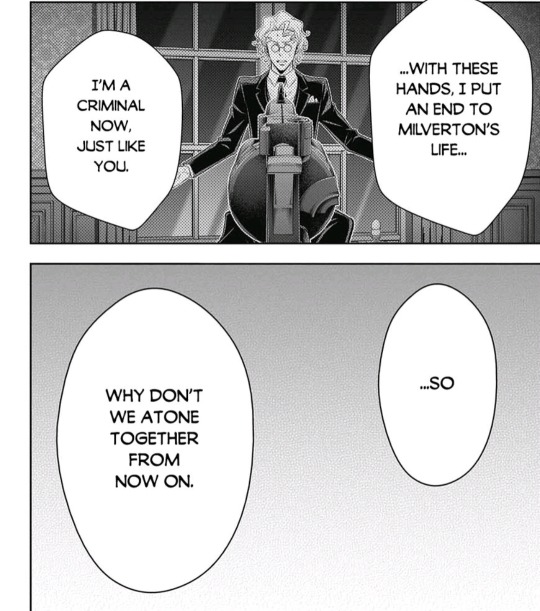
I think, in some ways, here Sherlock also confesses that he has lost the mandate or the right to catch William as a detective on the right side of the law.
He's not standing there as someone catching a criminal.
They're now standing as equals. Friends (or whatever you call that tension they have going on LOL), rivals, equals.
It's no longer "catch" in the criminal sense, but to "catch" a falling friend. A trust fall, if you will.
(It just occurred to me that the whole chapter is just a trust fall exercise on a large scale LMAO)
This changes the whole trajectory of what William believes in. That seed of doubt has been planted in him - that he could, perhaps, still find forgiveness.
More importantly, that he has Sherlock's forgiveness.
And that is what allows him to live on.
#yuukoku no moriarty#moriarty the patriot#sherliam#my writing#the thoughts are falling#sherlock holmes (mtp)#william james moriarty#just a bit of introspection#sparked by my obsession with morimyu#yes I recently rewatched op.3#the falling in my username actually stands for falling apart#which is exactly what is happening to me every time i think about sherliam#i fall apart
70 notes
·
View notes
Text
I wrote a reply to this post but OP has deleted it and even though I should probably leave well enough alone, it got to me that I could have sworn I saw this post months ago and then realized it was actually from yesterday. This is a long reply so I'm putting it under a cut, but after I went to OP's blog and saw a post from them complaining how mean everyone was to them on this post, I replied to say I'm sorry if they got any anon hate I don't know about but otherwise none of the comments on this post were mean or hateful, they just disagreed with OP. I pointed out that this is partly because they cited non-canon events as canon, and OP immediately blocked me (this may be why I can't reblog the post even from another user, though that's not how tumblr usually works so who knows). I can't help but feel that OP's post was made in bad faith, as a result, and I've seen enough people on this hellsite who are more interested in protecting their egos than admit when they could have been approached something more thoughtfully, so I'm diving in. If you're going to say a character "is very interesting to study" while doing the exact opposite, then you'd better have the critical analysis skills and textual evidence to back it up.
I think OP has some misconceptions that are frustratingly common, and seem to stem from people not having read the books, or not read them for a long time, and conflating the movies with canon. While I mostly agree with the replies above, I want to take this opportunity to cite the text to refute some of OP's points. I often forget details from the text, but I choose to either look them up before asserting unconfirmed points as fact (Potter Search is a great tool, or you can just do a ctrl+F search if you have the books digitally), or else I usually state clearly that I'm not sure if I remember something correctly and don't have the spoons to look it up.
I saw OP say in the comments in response to someone arguing their points:
"that's your interpretation, I have mine, I think both can coexist within the material we are given."
It doesn't sit right with me that so many people think that referring to their subjective memory of what the text meant to them is the same as actually citing it and offering an explanation. OP's interpretation can't exist within the material given, because some of it doesn't exist in the material at all, and you can't interpret what isn't there. OP is essentially claiming to have done critical analysis, and although no one is required to always critique a text analytically on a tumblr post, I find it upsetting when people claim to do so while failing to cite a single source to support their argument. To me it sounds like someone trying to pass off a creative writing essay as an academic research paper, and in an age of rampant propaganda and knee-jerk reblogs that eschew critical thinking, I feel an almost compulsive need to go through OP's reply and argue it with the textual evidence they conveniently avoided, if for no other reason than to show why it's important to discern between loosely formed opinions and informed ones.
I also want to explain why I don't accept the films as canon, because while I do think that canon can exist across several mediums (such as with Good Omens, in which at least one of the writers of the text is directly involved in writing the TV series), I don't think that applies to Harry Potter because the original author was only marginally involved in the films, in only a consultant role, and had little input on the writing. The HP films are an interpretation as written from the perspective of Steve Kloves, except for OoTP, which was written by Michael Goldenberg. I've gone into it on other posts, but suffice to say these interpretations did not prioritize story and character development and were often influenced by pressure from the studio to prioritize marketing opportunities over storytelling. Important elements like foreshadowing and themes were not carried over from the text to the screen. These changes affected the storytelling significantly and left out crucial elements. This, combined with the films having been written with little to no involvement from the original author, is why I feel the films can't be taken as canon. This doesn't mean they can't be enjoyed by any means, just that they scenes that appear in the films but not in the text, or are presented differently on screen than in the text, are not a reasonable basis for character analysis.
And now, on to OP's ask:
"I think he is a very good representation of a man who felt insecure in his manhood; his male ego was permanently wounded by James' bullying and he decided to make it everyone else's problem by being the most insufferable teacher at Hogwarts."
The first thing we have to establish is that the books are told from Harry's perspective, so we have to take narrative bias into account. Calling Snape "the most insufferable teacher at Hogwarts" is a subjective statement and I can only assume it's based in Harry's biased perspective as narrator, given that he and Snape have a bad relationship from the outset. I have a brief analysis here about how Snape dislikes Harry because in their first class together he interprets Harry's ignorance of the course material as a lack of curiosity and appreciation for his gifts as a wizard, while also recognizing something of his own experiences with childhood poverty and abuse in Harry. Harry, being ignorant of these factors, just feels singled out for hate by a strict teacher, and their relationship deteriorates throughout the rest of the series, until the end of the final book.
To pull back from the narrative bias, let's look at some of the other teachers are Hogwarts:
McGonagall:
“Miss Granger, you foolish girl, how could you think of tackling a mountain troll on your own?”
Hermione hung her head. Harry was speechless. Hermione was the last person to do anything against the rules, and here she was, pretending she had, to get them out of trouble. It was as if Snape had started handing out sweets.
“Miss Granger, five points will be taken from Gryffindor for this,” said Professor McGonagall. “I’m very disappointed in you. If you’re not hurt at all, you’d better get off to Gryffindor Tower. Students are finishing the feast in their Houses.”
Philosopher's Stone, Ch. 10.
“I’m disgusted,” said Professor McGonagall. “Four students out of bed in one night! I’ve never heard of such a thing before! You, Miss Granger, I thought you had more sense. As for you, Mr. Potter, I thought Gryffindor meant more to you than this. All three of you will receive detentions — yes, you too, Mr. Longbottom, nothing gives you the right to walk around school at night, especially these days, it’s very dangerous — and fifty points will be taken from Gryffindor.”
“Fifty?” Harry gasped — they would lose the lead, the lead he’d won in the last Quidditch match.
“Fifty points each,” said Professor McGonagall, breathing heavily through her long, pointed nose.
Philosopher's Stone, Ch. 15
In just the first book we see McGonagall punish Hermione for successfully defending herself against a troll and take house points, then sends her back to her common room without getting medical attention, as if a ten year old can be responsible for assessing how badly they're hurt. A few chapters later McGonagall takes several hundred points from students in her own house (more than we see any other teacher do at one time throughout the series), and assigns the students detention on top of it. As we later see in the same chapter, the detentions aren't even served with her directly, but instead the children - again, ten years old - are sent into the Forbidden Forest at night with only Hagrid to protect them, to hunt down whatever creature is vicious and cunning enough to kill unicorns.
Although it's said that Snape favors the students in his own house, he doesn't seem to be the only one:
“Potter's been sent a broomstick, Professor,” said Malfoy quickly.
“Yes, yes, that’s right,” said Professor Flitwick, beaming at Harry. “Professor McGonagall told me all about the special circumstances, Potter. And what model is it?”
“A Nimbus Two Thousand, sir,” said Harry, fighting not to laugh at the look of horror on Malfoy’s face. “And it’s really thanks to Malfoy here that I’ve got it,” he added.
Philosopher's Stone, Ch. 10
Not only did McGonagall make an exception to school practices and allow Harry on his house Quidditch team despite being a first year, she used either school funds or her own (unclear) to purchase a first-rate broom for him. We know the school has brooms, as first years are not allowed their own and they are provided for flying lessons, and because “Harry had heard Fred and George Weasley complain about the school brooms” (PS ch. 9). And yet, McGonagall ensures Harry has his own broom, and an expensive one, new enough to be the show model in a shop window in Diagon Alley a few months earlier:
“Several boys of about Harry’s age had their noses pressed against a window with broomsticks in it. ‘Look,’ Harry heard one of them say, ‘the new Nimbus Two Thousand - fastest ever -”
-Philosopher's Stone, Ch. 5
If we're discussing which teachers are Hogwarts are the most "insufferable" then we also have to talk about Hagrid, who might mean well and be affectionate, but is also irresponsible and dangerous.
In Philosopher's Stone, Hagrid:
Punishes Dudley, a child, for his parents' offenses, the final straw being his father insulting Dumbledore (Ch. 4). While Hagrid acknowledges that he shouldn't have lost his temper, he also admits that his intention had been to turn Dudley fully into a pig.
Hatches a dragon in his cabin (Ch. 14), tries to raise it illegally and against the animal's need of care, and Harry, Ron, and Hermione (again, ten year olds) have to fix the situation and get Ron's brother to find some friends to take the dragon away safely and prevent Hagrid losing his job (Ch. 14). In the process Hagrid endangers himself as well as the children, and it's because of this that McGonagall gives them detention and deducts hundreds of house points. Hagrid not only allows the children to endanger themselves for his sake, but to be punished and subsequently ostracized by their peers also for his sake.
The reason he even has a dragon is, as we find out in Ch. 16, because he was foolish enough to accept it from a faceless stranger in exchange for unwittingly divulging the secret to getting past the three headed dog guarding the Philosopher's Stone (and the stranger later turns out to be Quirrel/Voldemort).
In Prisoner of Azkaban, Hagrid:
Starts his first lesson with a volatile creature (Ch. 6) and, although Malfoy acted irresponsibly, Hagrid was nevertheless the teacher and responsible for providing course material consistent with the experience level and maturity of his students' age.
Gets drunk and has to be taken care of by Harry, Ron, and Hermione (again, children) (Ch. 6)
Skipping ahead to Order of the Phoenix ch. 30, we find out Hagrid
Compromised his return from the mission Dumbledore sent him on by bringing a giant back to England.
Brought said giant into the school grounds and left him in the Forbidden Forest.
Asks Harry and Hermione (still children) to look after him if Hagrid is sacked.
Although Hagrid means well, his actions are consistently thoughtless and irresponsible, requiring those around him - often Harry, Ron, and Hermione - to fix the damage he causes. Although I think it remains subjective which teacher at Hogwarts is the "most insufferable" I think Hagrid is a strong enough candidate to qualify OP's interpretation of Snape holding that title as extremely contestable. Of course, since the books are presented through the lens of Harry's narrative bias, and he's fond of Hagrid, respects McGonagall, and dislikes Snape, an uncritical reading could lead one to OP's conclusions. However, a more objective analysis of the text shows that many teachers at Hogwarts are strict, punitive, biased, and wreak havoc on students in ways that make the Snape's actions look fairly tame, or at least the norm. And this is excluding an analysis of various DADA professors like Lockhart and Crouch/Moody, who were insufferable in their own rights (Lockhart was smarmy and dishonest to the point it risked students' lives; Crouch/Moodly transfigured a child into a ferret and humiliated him with torture as a disciplinary measure and deliberately triggered Neville's trauma in class).
OP continues their reply to say:
Add to this that he is a halfblood and only his mother was around, iirc?
They don't recall correctly. Snape, whose father was a muggle and whose mother was a witch, was indeed a half-blood (as is evidenced by him being revealed to be the Half-Blood Prince - I assume I don't need to cite a source as this is a pretty well-known fact and the literal title of an entire HP book, but should you need a reference it's in Ch. 28 of HBP). Both his parents were around in his childhood:
Snape staggered - his wand flew upwards, away from Harry - and suddenly Harry’s mind was teeming with memories that were not his: a hook-nosed man was shouting at a cowering woman, while a small dark-haired boy cried in a corner …
-Order of the Phoenix, Ch. 26
‘How are things at your house?’ Lily asked.
A little crease appeared between his eyes.
‘Fine,’ he said.
‘They’re not arguing any more?’
‘Oh, yes, they’re arguing,’ said Snape. He picked up a fistful of leaves and began tearing them apart, apparently unaware of what he was doing. ‘But it won’t be that long and I’ll be gone.’
‘Doesn’t your dad like magic?’
‘He doesn’t like anything, much,’ said Snape.
-Deathly Hallows, Ch. 33
We know that Snape's father was around because he's mentioned both in Snape's memories in OoTP that Harry accidentally invades during an Occlumency lesson, and when we see in Snape's memories that he gives Harry as he dies. Lily asks about his home life by referring to both his parents, implying that his dad is a consistent presence at home. We also know from JK Rowling that Snape's father "didn't hold back when it came to the whip" but this is supplementary and not mentioned in canon, so I don't expect anyone to refer to it when analyzing the text, I'm just adding it as bonus material.
Continuing on with OP's reply:
Snape, Voldemort and Harry all act like foils of each other in that sense, but whereas Voldemort fixated on his blood status as the main reason for his insecurities, Snape fixated on Lily.
So much to unpack here. Firstly, all of this should be backed up by examples from the text, as they are subjective readings that have significant bearing on character analysis.
Snape, Harry, and Voldemort don't act like foils of each other. For one thing, a character doesn't act like a foil, a character either is or isn't one. That being said, I don't know OP's background and there could be a language barrier because English isn't everyone's first language, I'm just being pedantic. Even with that in mind, the statement remains incorrect. A foil is a literary device - a character who contrasts with another character, often with the protagonist. It is not a choice a character makes or an action they take.
In Philosopher's Stone Snape is set up as a foil to Harry in order to misdirect the reader from suspecting the real villain, Quirrel/Voldemort. Snape is presented as secretive, sneaky, and nefarious, contrasting Harry's role as a protagonist who is outspoken, honest, and brave. As the series progresses, Snape, along with Voldemort, are eventually shown to have more parallels than contrasts with Harry. Snape and Voldemort were born into muggle poverty, and although Harry was raised in a middle class home by the Dursleys, they thrust poverty and neglect onto him in a way that parallels his childhood of neglect and want with that of Snape and Voldemort. Snape's father was abusive, as was Harry's guardian, Vernon Dursley. Harry, Voldemort, and Snape all had traumatic experiences growing up in muggle environments. If anything, Snape and Voldemort might be foils to Harry in that they both harbored resentment for their muggle fathers in ways that signified the separation between the wizarding and muggle world, while Harry's experiences with the Dursleys didn't color his image of muggles in a comparable way.
The contrast between Harry, Snape, and Voldemort is in the way each of them deals with their trauma. As Dumbledore says:
"It is our choices, Harry, that show what we truly are, far more than our abilities."
-Chamber of Secrets, Ch. 18
This becomes one of the overarching themes of the HP series, Harry, Snape, and Voldemort are all examples of how their choices took them to such different places in life from their comparable childhoods.
At school Voldemort was a handsome boy with talent, intelligence, and the recommendations of his teachers, but he chose to pursue power instead of success:
“He reached the seventh year of his schooling with, as you might have expected, top grades in every examination he had taken. All around him, his classmates were deciding which jobs they were to pursue once they had left Hogwarts. Nearly everybody expected spectacular things from Tom Riddle, prefect, Head Boy, winner of the Special Award for Services to the School. I know that several teachers, Professor Slughorn amongst them, suggested that he join the Ministry of Magic, offered to set up appointments, put him in touch with useful contacts. He refused all offers. The next thing the staff knew, Voldemort was working at Borgin and Burkes.”
Half-Blood Prince, Ch. 20
Snape chose to become a Death Eater for reasons we can only assume. We know he was in Slytherin during an era when Voldemort was in power and many of his allies had children in Slytherin house. At least two of Snape's dorm-mates, Mulciber and Avery, are canonically acknowledged to have become Death Eaters (both are present at the Ministry when Harry and his friends fight the Death Eaters in the Department of Mysteries in OoTP Ch. 35). It's unclear whether Snape chose to become a Death Eater out of admiration for them or out of peer pressure, or perhaps a lack of other options, while at school:
'… thought we were supposed to be friends?’ Snape was saying. ‘Best friends?’
‘We are, Sev, but I don’t like some of the people you’re hanging around with! I’m sorry, but I detest Avery and Mulciber! Mulciber! What do you see in him, Sev? He’s creepy! D’you know what he tried to do to Mary Macdonald the other day?’
Lily had reached a pillar and leaned against it, looking up into the thin, sallow face.
‘That was nothing,’ said Snape. ‘It was a laugh, that’s all -‘
‘It was Dark Magic, and if you think that’s funny -‘
‘What about the stuff Potter and his mates get up to?’ demanded Snape. His colour rose again as he said it, unable, it seemed, to hold in his resentment.
-Deathly Hallows, Ch. 33
It's unclear what Snape thinks of Avery and Mulciber, as his reply to Lily is downplaying but doesn't defend their actions. We see Snape's indecisiveness later in the argument he has with Lily after he calls her a Mudblood:
'It’s too late. I’ve made excuses for you for years. None of my friends can understand why I even talk to you. You and your precious little Death Eater friends - you see, you don’t even deny it! You don’t even deny that’s what you’re all aiming to be! You can’t wait to join You-Know-Who, can you?’
He opened his mouth, but closed it without speaking.
‘I can’t pretend any more. You’ve chosen your way, I’ve chosen mine.’
‘No - listen, I didn’t mean -‘
‘- to call me Mudblood? But you call everyone of my birth Mudblood, Severus. Why should I be any different?'
-Deathly Hallows, Ch. 33
Although Snape does ultimately choose to become a Death Eater, we see in his reply to Lily about both Avery and Mulciber and later her assumption that they all want to become Death Eaters that Snape doesn't argue for or against her accusations, but instead is evasive and unsure of himself. He opens his mouth to speak when she accuses him of wanting to become a Death Eater, but then closes it again without saying anything - he can neither argue against her point, nor state clearly, let alone with any kind of conviction, that this is indeed his ambition. It can be argued that it's the passivity of his choice that lands him with a Dark Mark on his arm, and it's the active choice he makes to risk his life in order to defect from Voldemort's ranks and turn spy that defines his character and without which Harry could not have defeated Voldemort.
Harry, as the protagonist, is also significantly defined by the theme of choice:
'But, sir,’ said Harry, making valiant efforts not to sound argumentative, ‘it all comes to the same thing, doesn’t it? I’ve got to try and kill him, or -‘
‘Got to?’ said Dumbledore. ‘Of course you’ve got to! But not because of the prophecy! Because you, yourself, will never rest until you’ve tried! We both know it! Imagine, please, just for a moment, that you had never heard that prophecy! How would you feel about Voldemort now? Think!’
Harry watched Dumbledore striding up and down in front of him, and thought. He thought of his mother, his father and Sirius. He thought of Cedric Diggory. He thought of all the terrible deeds he knew Lord Voldemort had done. A flame seemed to leap inside his chest, searing his throat.
‘I’d want him finished,’ said Harry quietly. ‘And I’d want to do it.’
‘Of course you would!’ cried Dumbledore. ‘You see, the prophecy does not mean you have to do anything! But the prophecy caused Lord Voldemort to mark you as his equal … in other words, you are free to choose your way, quite free to turn your back on the prophecy! But Voldemort continues to set store by the prophecy. He will continue to hunt you … which makes it certain, really, that -'
‘That one of us is going to end up killing the other,’ said Harry. ‘Yes.'
-Half-Blood Prince, Ch. 33
There's a clear point made by the author through Dumbledore as her proxy here, that choice is what matters, not fate. It's Harry's choices that make him the person he is and lead him to eventually defeat Voldemort. While Snape, Voldemort, and Harry all can be contrasted through the lens of their choices, this does not make them foils, as it is the the theme of choice and how it is exemplified by each character that makes them unique, but their experiences and many of their character traits (boldness, bravery, a personal sense of conviction) that make them parallels of one another. Each of them occupies their own place on the spectrum between the light and dark that the series establishes, Voldemort at the dark end, Harry at the light, and Snape in the grey area between them.
OP goes on to say:
His character is all about male entitlement, he was obsessed with her at Hogwarts and then showed to have no boundaries as he went into her house to cradle her dead body in front of her traumatized kid.
There's a lot to unpack here, and it's particularly challenging because you can't provide textual evidence for something that didn't happen in the text. After the above scene from Ch. 33 of DH in which Lily ends her friendship with Snape, we never see them interact again:
'No - listen, I didn’t mean -‘
‘- to call me Mudblood? But you call everyone of my birth Mudblood, Severus. Why should I be any different?’
He struggled on the verge of speech, but with a contemptuous look she turned and climbed back through the portrait hole …
The corridor dissolved, and the scene took a little longer to reform: Harry seemed to fly through shifting shapes and colours until his surroundings solidified again and he stood on a hilltop, forlorn and cold in the darkness, the wind whistling through the branches of a few leafless trees. The adult Snape was panting, turning on the spot, his wand gripped tightly in his hand, waiting for something or for someone …'
-Deathly Hallows, Ch. 33
The scene in the corridor in front of Gryffindor Tower between a fifth year Snape and Lily leads directly into the scene where Snape begs Dumbledore to protect the Potters (which I wrote an analysis of a few months ago but is too long a subject to derail this post for). We see no more interactions between Snape and Lily, and therefore there is no canonical support for the idea that Snape behaved obsessively or failed to respect her boundaries.
There's also no mention of Snape going to Godric's Hollow at all after her death. Snape holding Lily's dead body is only shown in the film version of Deathly Hallows, and as mentioned, the films are not canon. That moment doesn't exist in the text and can't be considered in an analysis of Snape's character. The scene on the hilltop leads directly into the scene of Snape crying in Dumbledore's office:
The hilltop faded, and Harry stood in Dumbledore’s office, and something was making a terrible sound, like a wounded animal. Snape was slumped forwards in a chair and Dumbledore was standing over him, looking grim. After a moment or two, Snape raised his face, and he looked like a man who had lived a hundred years of misery since leaving the wild hilltop.
‘I thought … you were going … to keep her … safe …’
‘She and James put their faith in the wrong person,’ said Dumbledore. ‘Rather like you, Severus. Weren’t you hoping that Lord Voldemort would spare her?’
Snape’s breathing was shallow.
-Deathly Hallows, Ch. 33
This is the only depiction of Snape immediately following the Potters' deaths. The scene of him cradling Lily's dead body was Steve Kloves' invention and has no basis in canon. If anything, Snape's actions in canon can be interpreted to show that he respected the boundaries Lily set, and that even when her life was at risk he chose to go to Dumbledore - who he thought might kill him on sight - rather than talk to her directly after she ended their friendship. In addition, in all the information the text gives about the night Voldemort fell in Godric's Hollow and Hagrid collected Harry to take him to Privet Drive, there's no mention of Snape whatsoever.
There isn't much in the text to support the interpretation that Snape exemplified male entitlement either. So far we've seen him being as strict, if not milder, than other teachers at the school, his favoritism is also comparable to that of other teachers - implying it's more of a norm than an example of entitlement - and there are no canonical examples to support the argument that he was obsessed with Lily or violated her boundaries. Snape struggles to argue with Lily when she accuses and berates him, and the usual markers of patriarchal entitlement - silencing women, gaslighting, dismissing women's opinions, talking over them - are all nowhere to be found in any of their interactions. The only time we see him lash out at Lily is when he calls her Mudblood (OoTP Ch. 28) which, while inexcusable, he does under traumatic duress, and is not indicative of his usual interactions with her, as exemplified by the fact that she ends their friendship over it. As cited before:
'No - listen, I didn’t mean -‘
‘- to call me Mudblood? But you call everyone of my birth Mudblood, Severus. Why should I be any different?’
There's a clear implication that Snape has never called her this before. An argument can also be made that it speaks volumes of Lily's own biases, or perhaps her own affection for Snape (who, not long before this, was still her best friend), that she excused this behavior from him when it was directed at others, and only took issue with it when it was directed at herself. That, combined with Lily's own acknowledgment that they were "best friends" shows that Snape's relationship with her was a balanced, consensual one even when it became strained, up until their friendship ended.
Continuing with OP's points:
He only saw Lily as a trophy to be possessed, which you can see from the way he hated Harry, because Harry reminded him Lily wasn't his and that Lily had sex with another man.
There's no support for this in the text anywhere and is pure conjecture. I can appreciate it being OP's headcanon, but it's certainly not a result of studying the text and relying on it to form opinions, but rather seems to be OP projecting pre-conceived notions onto Snape as a character and trying to find justification for it. I've written a whole post extrapolating Snape's first class with Harry, but the tl;dr is that Snape, who grew up in muggle poverty and knew Aunt Petunia enough to guess that Harry didn't fare well in her care when he showed up at school bearing signs of neglect, likely expected Harry to have the same hunger for learning that he himself did at Harry's age. Instead, Harry couldn't answer a single one of his questions and showed no curiosity or enthusiasm towards being a wizard as far as Snape could tell.
Nevertheless, even though Snape did seem to dislike Harry, hate is an awful strong word given that it is revealed at the end of Deathly Hallows that Snape has risked his own life to protect him. This isn't particularly surprising when you consider that this goal was established as early as Philosopher's Stone, when Snape protected him, which Harry initially interpreted as Snape trying to kill him:
Harry couldn’t take it in. This couldn’t be true, it couldn’t.
‘But Snape tried to kill me!’
‘No, no, no. I tried to kill you. Your friend Miss Granger accidentally knocked me over as she rushed to set fire to Snape at that Quidditch match. She broke my eye contact with you. Another few seconds and I’d have got you off that broom. I’d have managed it before then if Snape hadn’t been muttering a counter-curse, trying to save you.’
‘Snape was trying to save me?’
‘Of course,’ said Quirrell coolly.
-Philosopher's Stone, Ch. 17
Again, the story is told through the lens of Harry's bias, but that doesn't mean his opinions of Snape reflect Snape's character. As another example, there's an implication in OoTP that Snape, having seen some of the Dursleys' abuse of Harry through his memories during Occlumency lessons, passed this information on in an effort to protect Harry, and that this is the reason why several Order members (Arthur Weasley and Moody in particular) show up at King's Cross at the end of the schoolyear and threaten the Dursleys to stop mistreating him. There seems to be no other explanation in the text for why these adults are suddenly aware of the abuse Harry experiences, except that Snape, who was abused as a child himself, and who is an Order member himself, is the only adult in the series who we see witness Harry's mistreatement firsthand. At no point in the narrative do we see Harry complain about the Dursleys to the adults he trusts or ask them for help, merely to spend his holidays away from them without explanation.
While Snape did indeed dislike Harry and often compared him to his father, his dislike for James had much more significant roots in bullying and trauma than in his concern for Lily's relationship with him. It's established in canon that James Potter and Sirius Black dislike Snape from the outset (as in the scene on the Hogwarts Express in DH Ch. 33). In their fifth year, Sirius - annoyed that Snape is so curious about where Lupin goes each month - tricks Snape into following the tunnel under the Whomping Willow to the Shrieking Shack, as Lupin tells Harry:
'Professor Snape was at school with us. ... Sirius here played a trick on him which nearly killed him, a trick which involved me -‘
Black made a derisive noise.
‘It served him right,’ he sneered. ‘Sneaking around, trying to find out what we were up to … hoping he could get us expelled …'
'Severus was very interested in where I went every month,’ Lupin told Harry, Ron and Hermione. ‘We were in the same year, you know, and we - er - didn’t like each other very much. He especially disliked James. Jealous, I think, of James’s talent on the Quidditch pitch … anyway, Snape had seen me crossing the grounds with Madam Pomfrey one evening as she led me towards the Whomping Willow to transform. Sirius thought it would be - er - amusing, to tell Snape all he had to do was prod the knot on the tree-trunk with a long stick, and he’d be able to get in after me. Well, of course, Snape tried it - if he’d got as far as this house, he’d have met a fully grown werewolf - but your father, who’d heard what Sirius had done, went after Snape and pulled him back, at great risk to his life … Snape glimpsed me, though, at the end of the tunnel. He was forbidden to tell anybody by Dumbledore, but from that time on he knew what I was …'
-Prisoner of Azkaban, Ch. 18
From this we can deduce that Sirius intended for Snape to die, or at least get severely injured, and that even as a grown adult Sirius doesn't regret trying to mete out this punishment to him as retaliation for curiosity. We can also deduce that Lupin was unaware of Sirius' intention and did not consent to be used as a weapon. For his part, Snape never did reveal that Lupin was a werewolf while at school, or even during that school year, until after Lupin ran amok on Hogwarts grounds, endangering others' lives, including Harry's.
There are other meta posts that go into Lupin's insecurities and vulnerabilities, but in short, he was grateful just to be allowed into the school as a student, let alone to have friends, and was in no position to challenge James and Sirius. Even as a prefect he didn't curb their behavior, as we see when he allows James to bully Snape later that year after their O.W.L.s:
'Leave him alone,’ Lily repeated. She was looking at James with every sign of great dislike. ‘What’s he done to you?’
‘Well,’ said James, appearing to deliberate the point, ‘it’s more the fact that he exists, if you know what I mean …’
Many of the surrounding students laughed, Sirius and Wormtail included, but Lupin, still apparently intent on his book, didn’t, and nor did Lily.
‘You think you’re funny,’ she said coldly. ‘But you’re just an arrogant, bullying toerag, Potter. Leave him alone.’
‘I will if you go out with me, Evans,’ said James quickly. ‘Go on … go out with me and I’ll never lay a wand on old Snivelly again.'
-Order of the Phoenix, Ch. 28
James acknowledges that he has no real reason to bully Snape and uses violence as a bargaining chip to coerce Lily into going out with him (James' behavior reflects much more entitlement than Snape's, in my opinion). He also chokes Snape with a bar of soap and then assaults him by dangling him upside down and removing his trousers (threatening to remove his underwear but we don't see it happen).
Lily herself refers to James as arrogant, and it's this trait, along with the trauma from James' bullying of him, that Snape perceives in Harry. He doesn't resent Harry for looking like his father because it reminds him that Lily had sex with another man, he resents him for it because of all the trauma James inflicted on him. The conflict-laden relationship between Snape and the Marauders is a significant driver of the story through several of the books and OP seems subjective to the point of being problematic in ignoring it completely and instead focusing Snape's dislike of Harry onto an invented idea of sexual jealousy that doesn't exist in the text.
It's never stated whether Snape had romantic feelings for Lily, or vice versa, only that they were friends. The closest we see to a hint of this is when “The intensity of his [Snape's] gaze made her [Lily] blush," or when “The moment she [Lily] had insulted James Potter, his [Snape's] whole body had relaxed, and as they walked away there was a new spring in Snape’s step …”
Lily's blush could be interpreted as implying she was attracted to him, or conversely that she didn't and felt awkward thinking he might be attracted to her. Similarly, Snape's relief at her insulting James can be interpreted as indicative of his attraction to her, or of him simply being worried about a friend hanging out with people he perceived as dangerous and was relieved to learn she wasn't putting herself in the way of danger by becoming friends with them. Although JK Rowling has said that her intention was for Snape's affections towards Lily to be romantic, and that she may have returned his affection had he not chosen the path he did, this is - like the note about Snape's father whipping him - extratextual and more of an interesting fact than a bit of canon to be extrapolated from the text.
Finally, OP says:
His interest in the Death Eaters was only secondary to his obsession with Lily and I think Lily rejecting him pushed him toward joining the Death Eaters, because, once again, his male ego was bruised and he needed to replace it with something else.
We've already seen that Snape's interest in joining the Death Eaters was a big part of Lily's reason for ending their friendship. Therefore, logically, Lily's decision didn't push him towards becoming a Death Eater, but rather isolated him from having any support system outside of the DEs. She didn't reject him, because rejection is the refusal or dismissal of another person's advances or proposal. They were friends, meaning they had a mutually consensual platonic relationship. Lily therefore didn't reject Snape, she ended their friendship and, as already stated, nothing in canon implies he didn't respect her boundaries.
As we have also seen in canon, Snape was bullied at school and had, at best, a neglectful and dysfunctional home environment in his childhood. In addition, he shared a dorm with students actively interested in becoming Death Eaters, and his one social lifeline away from them was cut off when he called Lily a Mudblood. What OP interprets as Snape's male ego being bruised is actually a much more complex set of social and emotional factors being described throughout the series to eventually reveal the profile of a character - young Snape - who was a vulnerable youth primed for radicalization by a violent faction of zealots. Although the enforcement and upholding of patriarchal norms is often a huge element of these kinds of social movements, that didn't seem to be the driving force for Snape based on everything we learn about his character. Instead, what we see is a boy who comes from abuse, lives in abuse at school, who loses all the support systems that might give him an alternative to the fascist cult he's being radicalized into which - if it's like most hate groups - would have been more than welcome to both take him in and help him cut his ties to anyone else in his life he might escape from them to.
It also goes against the argument that Snape was sexually obsessed with Lily that he continued to risk his life in order to protect her son an defeat her murderer for almost two decades after her death. He knew it would neither bring her back from the dead nor bring about forgiveness, and it goes without saying that sex was no longer an option. Framing Snape's motivation as obsession dismisses the realities of the complex and meaningful relationship we form as people, and the lasting, transformative influence we can have on each other, which is what Snape and Lily's story illustrates.
Finally, OP concludes with:
He remained mysterious up till the end and his back-and-forth with treason was very compelling to read about. So I hate him (as a "person") but he is such a good character narrative-wise and he is very interesting to study
OP openly admits to hating Snape, ie. having a bias against him, while stating he is "interesting to study" - except no part of their answer has shown that they've actually done so. Their arguments are unsupported in several ways, one being that they don't offer any evidence, and the other being that none can be found in the source text. What's ironic is that OP seems to resent Snape's subjective bias against Harry (and misinterpret his reasons for it in baseless ways) while also showing the exact same kind of bias against Snape themselves. You don't have to like a character by any means, but claiming that the kind of unfounded, superficial, and unsupported opinions that OP stated in their response have a basis in any kind of study of his character is ludicrous and an insult to the intelligence of anyone reading it.
#long post#I'd say sorry to OP for ripping into their post like this but they think people disagreeing with them politely is mean and hateful so#but yeah sorry not sorry when your argument is so unfounded that it can be shredded with an entire cited essay then maybe#reconsider the claim that your opinions have any basis in study#and look I don't think OP is stupid by any means I think they knew exactly what they were doing and that's why I decided to argue them#even if they won't see it#I usually don't tend to argue with haters and prefer to spend my allotted hellsite time delving into meta but this one got to me
22 notes
·
View notes
Text
Putting "I hope jakey dies" on the shelf until people learn how to talk normally about bisexuals
#and t4t couples for that matter#like i know exactly what the jakey op meant but man who knew the meme made from bitterness would be used by overwhelmingly bitter ppl#congrats you found a memey way to shit talk lgbt people you dont like and you think arent queer enough#so progressive!
57 notes
·
View notes
Text


my signed copy of nona came in :’) my friend picked up my mail today and just dropped the package on the table in front of me while i was doing some work and said “enjoy having an unproductive rest of your day” and lemme tell y’all i tore into that package like a kid on christmas
#op#the locked tomb#nona the ninth#yeehaw!#the first physical copy of a book ive owned since literally middle school#it feels like a special moment#i think my friend is ten seconds away from bluedgeoning me with the hard cover copy because i haven’t shut up about it#she knew exactly what the package was and i ordered it seven months ago
312 notes
·
View notes
Note
Actually….re: the whole we have never gotten a glimpse ever of past crocodile thing….would be SO funny if crocodile’s backstory was just every strawhat’s combined in succession but like the wario bad ending version “a man took me and my brother in when we were extremely small children and THEN sold us out to pirates when he didnt have enough protection money who forced ys to work to buy our way out of slavery THEN my sister pushed me down the stairs and THEN she died and THEN i was taken in by a fishwoman and her apprentice. And THEN she framed me for pirate conspiracy and turned me into the marines—“ etc. etc.
Y'know, I know you're joking, just doing a silly little funny and all
But unironically, on a thematic level this could very well be true
Like One Piece's long running themes include rejection, loss, loneliness, either believing yourself to be unlovable and/or hating yourself while loving others and what all these things can drive a person to do (among many other things)
And these narrative elements come up so often you could make a little bingo card of them and have a fun little game to see how many pop up for each Strawhat and their backstories (Sanji and Robin being the most extreme examples in some ways).
But the thing is that with the Strawhats, most of them manage to find a way to heal through all that trauma either through their mentors, their friends/family, the Strawhats and/or Luffy specifically. They all found a place to call home through Luffy
But Crocodile never did. He doesn't have a place to call home, people to call a family. He's still alone
So like, while Croc's backstory probably isn't all the Strawhats mashed together literally, on that thematic level? Actually, yeah, probably, especially If Crocodad Real. He could just turn out to be an amalgamation of all the Strawhats' trauma combined but with the specific twist he never had anyone come save him from it, what any of the Strawhats could've turned out like had they never met Luffy and went off the deep end
#Moon posting#OP Meta#Asks#Sir Crocodile#This post ended up sounding like Daz Bones erasure I'm so sorry#I just don't exactly know what the dynamic between those two is right now#Like to me it still feels like Croc just sees Daz as a Very Useful Underling and is keeping him around because#1) The guy's useful and 2) Dude was faithful enough to go to Impel Down with Croc when he didn't have to#Like Daz has proven his worth in that sense#But Daz himself considders fellowship pointless so IDK if there is anything more to the relationship between these two#Beyond the ''boss and subortinate''#The point is that. I really want to know what the fuck these two were doing for the past two years#Just. Hanging out together. For two years. By themselves???????#That's a whole separate post though THE POINT IS#I unironically think it's very possible every single Strawhat could find at least one single thing in Crocodad's story they could relate to#If Crocodad Real
23 notes
·
View notes
Text
Someone got so triggered that I'm considering making some extra money (or rather by that their unsolicited advice wasn't met with a ritual buttlicking on my side ¯\_(ツ)_/¯) that they ran to rant on me on their blog, to rant how bad making money on hobbies is because capitalism, #eaththerich, and endangering community...I guess?
Vile me, looking on semi-empty stomach at 5.54pln left on my account week before next payment, wondering how I can squeeze a few bucks extra because through next few months when I have even more medical treatment spendings.
Vile me, being a writer. Maybe it would be forgiven to me if I were a craft maker or artist. After all, no one says a word on merch or art commission, or fanzines... ¯\_(ツ)_/¯
Anyway, if making money on fics is too much of a "black market" for you & you don't like seeing your favorite writers struggling, many of them have a ko-fi! So do I! Tips are legal, safe, and make everyone happy! ❤
#yeah pouring money into hobby drains the joy and love#but you know what drains the joy and love even faster?#FUCKING EMPTY STOMACH AND PRICES OF MEDS#from what i saw op is so triggered by the fact that i blocked them that they keep ranting with 3rd or 4th post now#i stopped counting what my friends send me LMAO#all of that because a stranger on the internet didn't want unsolicited advice stuffed down their throat 😂😂#bas mumbles#EDIT: people started reblogging the poll with vile intentions so i closed it & deleted it#not sure what will i do next & how exactly i will distribute access to those fics (unlike what the drama thrower assumed I *am* aware#of the grey sphere state and that i need to be relatively discreet#idk did they think im gonna sell it on amazon or what lol gimme a break)#but before those clowns started their circus majority of poll was for yes#so i will keep it in mind)
9 notes
·
View notes
Text
WAIT- is this one of the alternate timelines created from the space-time sword ("Shintō Amenogozen")!? 👀

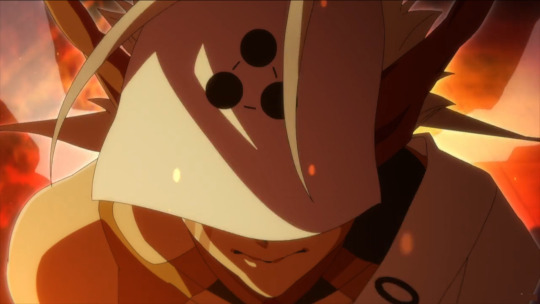

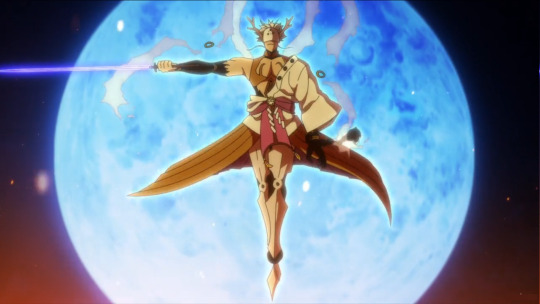
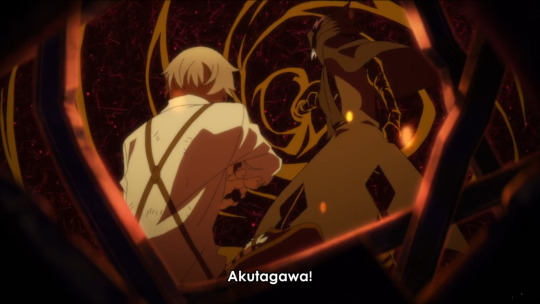
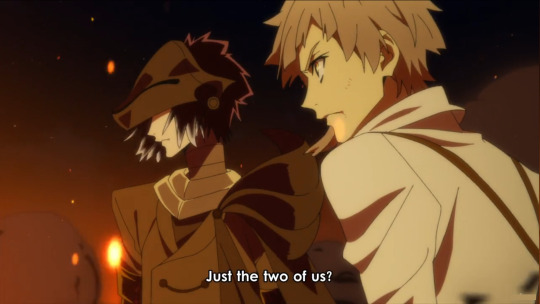
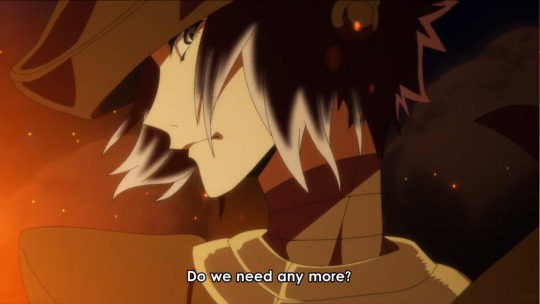
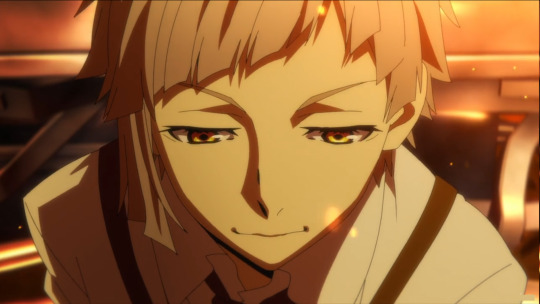

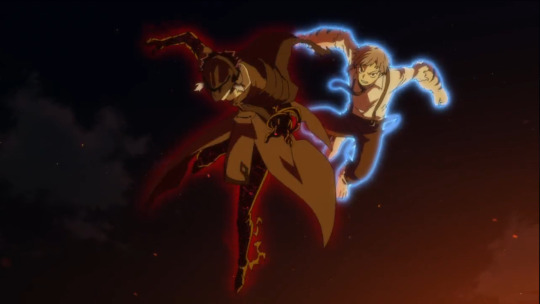
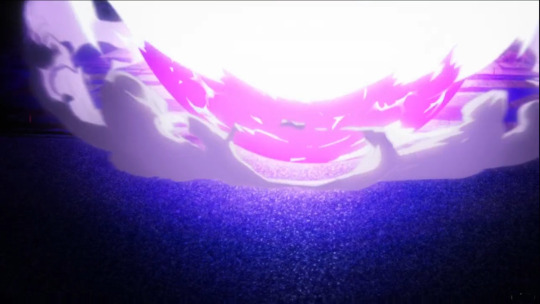
I'm an anime-only bsd enjoyer & ever since that damn sword popped up after Atsushi & Akutagawa killed him on the boat but he was able to erase/undo(?) that timeline, I've been thinking that technically means there's multiple timelines. This would be the one where Fukuchi won that conflict we just saw or something else entirely is going on given the way he's dressed (if that even is him)! 👀👀👀
#plz no spoilers I want to watch it without knowing whats going on yet; I think it absolutely has to do with multiple timelines though since#Fukuchi got absolutely folded from our POV. Also his legs in the future looked robotic??? maybe just lighting & art style; but something#isnt quite right about that guy; he's also FLYING??? like HUH??? what is going on??? absolutely wild... looks like an angel too 👀#I just hope this hiatus won't be multiple years long & force me to rewatch the whole series all over again just to understand whats going o#mind you; I don't exactly have a twitter to keep watch on series & anime announcements & things so I guess just tag me when we get a season#announcement and release date I guess?? just let me know. Adhd & series going on hiatus is not a good combo LOL#genuinely had to rewatch for this season because I only found out that it was going on through someone I follow reblogging a gifset & not#even tagging it. LOL like I could have just not known or gone the whole season without knowing since it's a more niche anime#okay I think I've rambled enough in the tags to get this post to show up in the search engine PLZ NO SPOILING the series for me btw#I will block liberally 👀#mine#op#bungo stray dogs#bsd#bungou stray dogs#bsd spoilers#bsd anime#bungou stray dogs anime#bungo stray dogs spoilers#live blogging
20 notes
·
View notes
Text
i really love dc x dp tbh but i hate how so many fics end up making the batfam dumb as shit. and i don't mean in a "loveable goof" kind of way but in a genuine "these people don't have the skills or intelligence to be heroes" kind of way. which is just antithetical to their entire thing
sometimes it's because the writer just genuinely doesn't know anything about the batfam or what they've been through so they come across as idiots. and other times it's because the writer is writing op ghost king danny or just generally op danny and they genuinely think he could outsmart or beat them. more often than not, it's a combination of the two.
it's just so sad. like not only is it disrespectul to the batfam, essentially getting rid of all the skills and experience they have just to prop up danny, but it also makes things a lot more boring imo. don't get me wrong, i don't mind the occasional "main character is super op" kind of story, but it's boring when like 70% of fics are like that and there's no real challenge or obstacle for him. part of why the show danny phantom was so fun was that it was exciting and chair gripping to see danny have to deal with his new ghost powers, figuring out how to deal with ghost attacks or vlad, and dealing with school and his parents on top of that.
but often, dc x dp fics just,, get rid of any challenge for him. sure batman is a skilled detective but danny will always be able to trick him! sure cass has been trained since birth to read people's body language but this random ghost teen knows how to conceal and control everything!! yeah damian has also been trained since birth to fight and kill but this random guy from the midwest who just started fighting in his teens is so much better!!! like, alright. it's fun every now and then but it sucks when so much of the dc x dp content is just people acting like the batfam are the worst vigilantes/detectives in the world.
and honestly i still feel this way even with the ghost king danny fics because how? he's never had to deal with people obsessively reading his body language or reading between the lines. he's had to deal with hiding stuff sure but his parents aren't the most observant people - their whole deal was being neglectful. even as a ghost king, why would he know how to outsmart, take advantage of, or beat the batfam in any capacity when he would still mostly deal with ghosts. it's a completely different skill set here - one that he likely wouldn't be prepared for. it'd be fine if they at least attempted to explain why danny would have those skills (like league danny aus) but most of them don't.
and i'm not saying danny couldn't do it at all, especially if it's a ghost king au, but i'm just tired of seeing the batfam constantly downplayed in these fics Just to make danny look better, smarter, stronger, etc. ik most people in the fandom are just danny fans but it really shows with how they treat, characterize, and shit on the dc characters just to prop danny up. it also serves to occasionally make danny look like an asshole when he intentionally messes with them and basically commits psychological torture for a goof.
#man...#i Do like this crossover but i completely understand why so many dc fans hate it#the oocness the fanon the constantly making these skilled trained characters fumble around and get outsmarted by Some Guy#ghost king danny isn't even canon to dp! which isnt a bad thing by any means ik the dp fandom goes crazy for fanon#and generally speaking the fanon Is a lot more fun and engaging than dp's canon#but as a dc fan its insane to watch#i want to engage more with dc x dp content so badly like this crossover is really interesting to me#but so much of it is just 'the bat.fam are actually fucking useless and my blorbo is so much better :)))'#it's almost like they dont even like the bat.fam!!! they keep saying they just dont know/understand them#but it fully feels like they straight up dont like the dc characters#it definitely comes across as 'hey this is a fun world to put danny in lets do that while also shitting on it and all of the characters'#'lol bruce is so stupid this random teen can outsmart him and he can lie to cass and he can beat dick in a physical fight lol'#there's a point where it stops feeling like indulgent op blorbo and more like insulting anyone who isn't danny#<thats actually exactly what it is and its insane to me like why even like crossovers if you dont want to engage with anyone but danny#how can you say you like them when you outright refuse to know them or respect them?#and obviously im using 'you' in a vague way im not specifically calling anyone out#ik there are people in the fandom who are genuinely fans of both and Do know and respect the dc characters#but so far its very few and far between which is just such a fandom culture shock for me#like in most fandoms im able to read a lot of fics and only occasionally think 'thats not right'#but with this one its the other way around - im constantly going 'they wouldnt say/do that at all why does the op think that?'#like 9 out of 10 fics im like 'oh yeah this person has never read a comic in their life'#i can immediately tell when someone has only read the webtoon its extremely obvious unfortunately#maybe i should make a dc masterlist for dp fans... like here you can write about them again After you do your homework ajdhgl
10 notes
·
View notes
Text
grateful to know what certain words mean. deeply annoyed that the words themselves are so engrained into pop culture that they end up losing meaning
#op#for once this isn’t about the word gaslighting#someone told me I was. fearmongering by describing the way IOT devices can be used to rob you#because someone ASKED#they ASKED why it would be bad if a baby monitor got hacked#and I answered#and someone goes ‘yikes ://// fearmongering are we’#like what exactly do you think I’m gaining from this dude#in what way do I profit from describing a spooky thing that is possible#do I look like the six o clock news to you
101 notes
·
View notes
Text
less "rolls and fat tummies are sooo hot >////<" body "positivity" posts and more "youre worthy of being alive and loving yourself whether or not your body meets your own or other peoples standards" and "hotness isnt defined by your weight" body positivity posts plz and thanks i dont like getting that familiar feeling of being fetishized and sexualized for my weight when i just wanna hate myself less tbh. like you can say fat people are hot without making it. weird and uncomfortable. you know that right. like some of these posts go into Way too much detail and im starting to think ppl are missing the point a bit.
#op#ask to tag idk what to put here#fat girls are already fetishized enough#you wear the same clothes skinny people wear as a fat girl and suddenly youre a sex object#its because#1. people see being skinny as a childish or youthful body type (yuck)#2. people see being curvy as a 'mature' body type (also yuck)#calling fat people hot for being fat isnt exactly the revolutionary thing you think it is and it just makes me feel nasty#im not wearing fem clothes nearly as much anymore.#but i remember when i used to dress up when i was younger i would always get comments from grown ass men#like plenty of people find fat people hot. thats not the problem.#if anything im tired of simultaneously being sexualized and also treated as worthless as a human being bro like what
17 notes
·
View notes